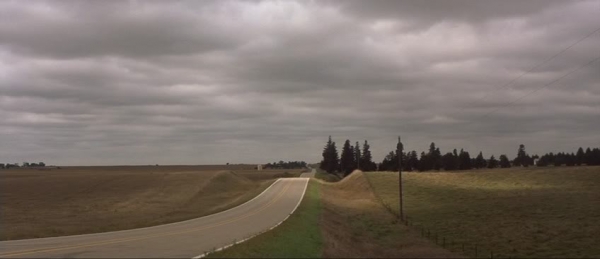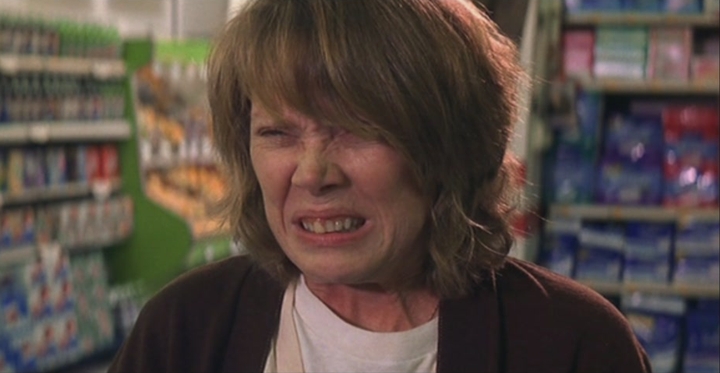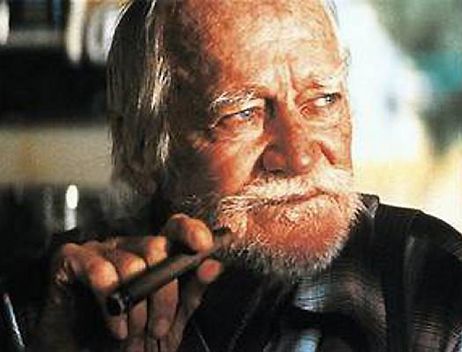 Here’s the scoop – see The Straight Story (2000) as soon as you can, mailed from Netflix, streamed from Amazon, or at your Blockbuster store. You won’t be disappointed. This Disney movie is G-rated, though it is not a movie particularly of interest to children. It’s for you.
Here’s the scoop – see The Straight Story (2000) as soon as you can, mailed from Netflix, streamed from Amazon, or at your Blockbuster store. You won’t be disappointed. This Disney movie is G-rated, though it is not a movie particularly of interest to children. It’s for you.
The movie’s pace is too slow, its dialogue sparse, and its action almost non-existent. Kids will get fidgety; but you won’t. The film is lyrical and humane, filled with yearning, wisdom and hope. Here is a movie for parent to take grandparent to see, or you to take your sibling to see, and then to reflect on afterwards over a cup of coffee.
The movie is fable-like, yet it is based on a real life story. Alvin Straight, a fiercely independent seventy-three year old in failing health, makes a three hundred and seventy mile trip across Iowa to seek reconciliation with his brother who has suffered a stroke. What makes this journey unique is the fact that given his bad hips, failing eyesight, and limited budget, Alvin can only get there by riding his John Deere lawn mower!
 Straight’s family was initially concerned that their father would be turned into a laughingstock by the movie, particularly when they learned that the film would be directed by the edgy, four-time Academy Award nominee David Lynch. But they had no need to fear. A painter who turned to film in order to get motion into his images, Lynch created a visual masterpiece from this simple plot. Seen chiefly through the eyes of Alvin, the photographic images of the rural Midwest are stunning.
Straight’s family was initially concerned that their father would be turned into a laughingstock by the movie, particularly when they learned that the film would be directed by the edgy, four-time Academy Award nominee David Lynch. But they had no need to fear. A painter who turned to film in order to get motion into his images, Lynch created a visual masterpiece from this simple plot. Seen chiefly through the eyes of Alvin, the photographic images of the rural Midwest are stunning.
 Dubbed the master of the weird for being the director of Eraserhead, Blue Velvet, and the TV series Twin Peaks, Lynch has chosen a different direction here, creating an elegant, if quirky, portrayal of what it is to be truly human. He has returned in style and theme to his Oscar-nominated The Elephant Man, the true story of how the real humanity of a badly deformed young man is discovered.
Dubbed the master of the weird for being the director of Eraserhead, Blue Velvet, and the TV series Twin Peaks, Lynch has chosen a different direction here, creating an elegant, if quirky, portrayal of what it is to be truly human. He has returned in style and theme to his Oscar-nominated The Elephant Man, the true story of how the real humanity of a badly deformed young man is discovered.
Crucial to the movie’s success is the actor Richard Farnsworth who plays Alvin Straight. Farnsworth was in pain when the movie was shot, having cancer in his bones, and he died soon after the movie was released. Seventy nine years old when the movie was shot, Farnsworth was a movie stuntman for most of his adult life before becoming an actor. Already nominated once before for an Academy Award, Farnsworth’s performance garnered him his second nomination. Time and again (after all, a power lawn mower can only go about four miles an hour), the camera lingers on Farnsworth’s face, particularly his eyes, and then on what Farnsworth sees. And as it does, we see straight into the very soul of Alvin (or is it into our own souls?).
The Straight Story is at one and the same time comic and wistful, offbeat and yet ordinary. It allows viewers to reflect–on the importance of family, of perseverance, and of a wisdom that comes through life.
Alvin Straight succeeds in his mission of reconciliation with his brother because he simply won’t give up—not when his hip gives out, not when his friends try to dissuade him, not even when the lawnmower breaks down. When someone who befriends him along the way offers to drive him to his brother, Alvin even refuses this offer. “You’re a kind man talking to a stubborn man,” he says. “I still want to finish this the way I started.” He must seek to end his estrangement with his ailing brother himself. And when his brother later asks him, “Did you ride that thing all the way out here to see me?” we sense the wisdom of his decision.
Behind Alvin’s journey is his recognition of the importance of family. On his several month journey, Alvin encounters a pregnant teenager who is running away from home out of fear that her family will reject her. He tells her that he used to play a game with his kids where he gave each a stick and told them to break it. They easily could. Then he would bundle all the sticks together and have them try to break them again. They couldn’t. Alvin then tells the girl, “That bundle—that’s family.”
 Alvin’s own daughter, Rose, is living with him because she is a “little slow.” Wonderfully played by Sissy Spacek, Rose has had her own children taken away by authorities because they claimed Rose is not competent to properly care for them. Alvin and Rose live daily with the pain of their absence – the sundering of their family. This estrangement is beyond their control. But Alvin can attempt reconciliation with his brother Lyle after a decade of anger and silence. And so, Alvin boards his power mower.
Alvin’s own daughter, Rose, is living with him because she is a “little slow.” Wonderfully played by Sissy Spacek, Rose has had her own children taken away by authorities because they claimed Rose is not competent to properly care for them. Alvin and Rose live daily with the pain of their absence – the sundering of their family. This estrangement is beyond their control. But Alvin can attempt reconciliation with his brother Lyle after a decade of anger and silence. And so, Alvin boards his power mower.
Along the way, Alvin gives to those he encounters a wisdom tempered both by the pain and disappointment of his life, and by life’s preciousness. He sarcastically tells some young bicyclists who are belittling him, “The worst part of being old is remembering when you were young.” But it is precisely such experiences that allow Alvin to see life more clearly. Throughout the movie, the viewer looks at what Alvin sees—the landscape, the line on the road, the sunrise, the faces of those he meets. And as we see what Alvin sees, we also see something more–the importance of family in making one’s life whole and full. Through the gift of Alvin’s simple humanity, we find our own humanity being expanded. Here is the straight story.
Reflecting on a theology of family
 The Straight Story reminds us that the word “family” is primarily a verb, rather than a noun. We “family” one another. The focus on the family is not on who we are, but on how we relate. Alvin can’t do anything about the authorities taking away his grandchild, but he can seek reconciliation with his brother. He can “family,” and so he does. Too often we make family into a noun, believing it is somehow our possession, our right to use or abuse as we so choose. We fail to recognize that family is not only a gift to us; it is a task for us.
The Straight Story reminds us that the word “family” is primarily a verb, rather than a noun. We “family” one another. The focus on the family is not on who we are, but on how we relate. Alvin can’t do anything about the authorities taking away his grandchild, but he can seek reconciliation with his brother. He can “family,” and so he does. Too often we make family into a noun, believing it is somehow our possession, our right to use or abuse as we so choose. We fail to recognize that family is not only a gift to us; it is a task for us.
The Old Testament often uses the Hebrew word “hesed.” It is usually translated “steadfast love.” But depending on the context, the word can emphasize either “steadfastness/perseverance” (cf., Ps. 145:8) or the unmerited gift of “love/grace” (cf., Dan. 1:9) Nevertheless, family thrives only when both senses of “hesed” are present. We blossom only when the unmerited gift of our family’s love is present, but this also demands of each of us a perseverance against all odds, a faithfulness and steadfastness that simply will not let go. Here is what Alvin discovered, something the punk teens who mocked him along the way and the pregnant runaway had no idea of yet.
 To act as “family” is to recognize that all members have value, a value given to them because they are created in the image of God. This is true for Rose who is “slow,” just as it is for her daughter who is taken from her. It is true for Alvin who is dying, just as it is for the young pregnant teen who is fearful of her parents. Just as with the bundle of sticks he would give his children, we are stronger when we act as part of the family of humankind.
To act as “family” is to recognize that all members have value, a value given to them because they are created in the image of God. This is true for Rose who is “slow,” just as it is for her daughter who is taken from her. It is true for Alvin who is dying, just as it is for the young pregnant teen who is fearful of her parents. Just as with the bundle of sticks he would give his children, we are stronger when we act as part of the family of humankind.
At our local art museum some time ago, there was an exhibit on how photographs of the human face capture the real self. But as a reviewer wrote, “When it comes to the mysterious matter of portrait photography and the human soul, it’s neither the artist’s nor the sitter’s soul that can be accessed with any reliability…only the soul of the audience is present and accounted for.” This critic was right. As we look at Farnsworth, we see a weathered face and an incredible journey. But even more, it is ultimately ourselves that we see. Alvin helps us get in touch with our own, God-given humanity. We are family.
